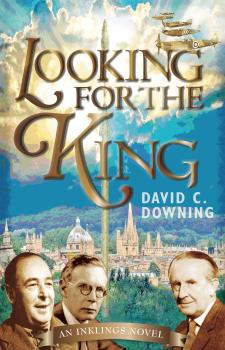Ingram
Все книги издательства IngramOn the Other Side of Fear
What happened to that girl?</p><p>What happened to the girl who was not afraid to climb to the top of the waterfall and jump. Who backpacked across Europe? Who took on any “feat of bravery” without batting an eyelash? You wouldn’t recognize her – she’s become that woman paralyzed by fear, scared to death to trust God, and trying to manage her family’s hectic life, financial crises (yes, plural), and family issues on her own steam.</p><p>Asking always, “Does God truly love me?”</p><p>Relatable, touching, and yet hopeful <strong>On the Other Side of Fear</strong> is the beautiful story of how one young woman learned to live in God’s will, without fear.
Looking for the King
It is 1940, and American Tom McCord, a 23-year-old graduate student, is in England researching the historical evidence for the legendary King Arthur. There he meets perky and intuitive Laura Hartman, a fellow American staying with her aunt in Oxford, and the two of them team up for an even more ambitious and dangerous quest.
Aided by the Inklings – that illustrious circle of scholars and writers made famous by its two most prolific members, C.S. Lewis and J.R.R. Tolkien – Tom and Laura begin to suspect that the fabled Spear of Destiny, the lance that pierced the side of Christ on the Cross, is hidden somewhere in England.
The Dawning of the Apocalypse
August 2019 saw numerous commemorations of the year 1619, when what was said to be the first arrival of enslaved Africans occurred in North America. Yet in the 1520s, the Spanish, from their imperial perch in Santo Domingo, had already brought enslaved Africans to what was to become South Carolina. The enslaved people here quickly defected to local Indigenous populations, and compelled their captors to flee. Deploying such illuminating research, The Dawning of the Apocalypse is a riveting revision of the “creation myth” of settler colonialism and how the United States was formed. Here, Gerald Horne argues forcefully that, in order to understand the arrival of colonists from the British Isles in the early seventeenth century, one must first understand the “long sixteenth century”– from 1492 until the arrival of settlers in Virginia in 1607.During this prolonged century, Horne contends, “whiteness” morphed into “white supremacy,” and allowed England to co-opt not only religious minorities but also various nationalities throughout Europe, thus forging a muscular bloc that was needed to confront rambunctious Indigenes and Africans. In retelling the bloodthirsty story of the invasion of the Americas, Horne recounts how the fierce resistance by Africans and their Indigenous allies weakened Spain and enabled London to dispatch settlers to Virginia in 1607. These settlers laid the groundwork for the British Empire and its revolting spawn that became the United States of America.
Father Solanus Casey, Revised and Updated
“What does it matter where we go? Wherever we go, won’t we be serving God there?” Father Solanus Casey (1870–1957) – Wisconsin native, Capuchin friar, and miracle-worker – lived this motto throughout his life. By his gentle, cheerful example, he taught others to have that same trust in God. Wherever he was sent – whether to parishes in New York City or monasteries in Detroit and tiny Huntington, Indiana – Father Casey was widely sought after for his wise counsel, powerful prayers, and miraculous healings. Visitors flocked to the humble monastery doorkeeper, seeking physical cures, advice, and spiritual renewal. Thousands of mourners attended his funeral in July 1957, hailing him as a modern saint. Catherine M. Odell proves that Father Casey’s witness remains more important than ever. Featuring first-hand personal accounts and 16 pages of photos, Father Solanus Casey takes readers past the ordinary appearance of this self-effacing friar into his extraordinary holiness. ABOUT THE AUTHOR Author Catherine M. Odell, a native of South Bend, Indiana, grew up and was educated in the shadow of Notre Dame’s “Golden Dome.” A freelance journalist, curriculum writer, editor, and teacher, she is the author of eleven other books, including Our Sunday Visitor’s Those Who Saw Her: Apparitions of Mary ; Faustina: Apostle of Divine Mercy ; Praying the Rosary for Intercession ; and Angels of the Lord: 365 Reflections on Our Heavenly Guardians (co-authored with Margaret Savitskas). Odell and her husband Bill have two grown children and make their home in South Bend. She is a committed organic gardener, baker, walker, and reader.
The Anti-Grief
What to do with the everything crossing one’s path? Everything for and against, upside down and inside out, grief first then its dogged shadow life, which could be joy. In <i>The Anti-Grief</i>, Marianne Boruch challenges our conceptions of memory, age, and time, revealing the many layers of perception and awareness. A book of meditations, these poems venture out into the world, jump their synapse, tie and untie knots, and misbehave. From Emily Dickinson’s chamber pot to meat-eating plants, from an angry octopus to crowds of salmon swimming upstream, Boruch’s imagery blurs the line between natural and supernatural. And of course there is grief—working through grief, getting over grief, living with grief, and in these magnificent poems, anti-grief.









